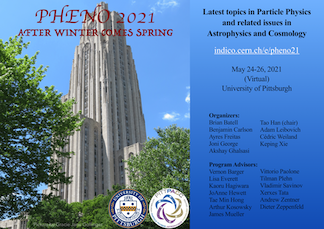IMPORTANT INFORMATION REGARDING PHENO 2021 IN LIGHT OF THE COVID-19 PANDEMIC
Due to the ongoing COVID-19 pandemic, Pheno 2021 will be host virtually. The full details of this virtual meeting will be made available soon. Registration for this virtual symposium will be free. The talk schedule will roughly follow the planned schedule as though its a physical meeting and will be held May 24 to May 26. We would like to encourage you to register and submit an abstract for a parallel talk. We hope to see you online in May!
PROGRAM
The 2021 Phenomenology Symposium will be held May 24-26, 2021 at the University of Pittsburgh. It will cover the latest topics in particle phenomenology and theory plus related issues in astrophysics and cosmology.
Registration deadline: May 23, 2021
Abstract submission deadline for parallel talks: May 3, 2021 (We do not accept abstracts anymore.)
Confirmed plenary speakers and topics:
- Tulika Bose (UW-Madison, CMS), Recent LHC Results
- Joseph Bramante (Queen's Univ., McDonald Institute and Perimeter Institute), Dark matter: new searches for ancient particles
- Bhupal Dev (Washington Univ.), Anomalies and their implications
- Keith Ellis (IPPP, Durham Univ.), New perspectives in particle physics
- Henriette Elvang (Univ. of Michigan), Scattering amplitudes and more
- Jim Halverson (Northeastern Univ.), Deep Learning Landscapes
- Laura Jeanty (Univ. of Oregon, ATLAS), Future Perspectives at HL-LHC
- Elizabeth Krause (Univ. of Arizona), Cosmology in 2021: Concordances and Tensions
- Danny Marfatia (Univ. of Hawaii), Non-standard neutrino interactions
- Maura McLaughlin (West Virginia Univ.), Physics with NANOGrav
- Patrick Meade (Stonybrook), Physics opportunities at future colliders
- Knut Moraa (Columbia Univ., XENON1T), Dark matter direct detection
- James Mott (FNAL), Muon g-2 and muon physics on Fermilab campus
- Regina Rameika (FNAL), Perspectives on neutrino physics
- Robyn Sanderson (University of Pennsylvania), GAIA and Dark Matter
- Veronica Sanz (Univ. of Sussex, UK), LHC phenomenology
- Christoph Schwanda (HEPHY, Vienna), Beauty physics from Belle II
- Natalia Toro (SLAC), Probing the dark sector
Mini-Reviews: (1). Hartmut Wittig (Johannes Gutenberg University Mainz), The SM expectation for muon g-2. (2). David Shih (Rutgers University), Anomaly Detection with ML.
Parallel session extension:
Due to the large number of contributed talk submissions, parallel sessions have been extended to include Wednesday afternoon from 2:00pm - 6:30pm.
FORUM ON EARLY CAREER DEVELOPMENT
Invited Speakers: Julia Gonski (Columbia Univ.), Sara Simon (Fermilab), and Midhat Farooq (APS)
"Physics Career Paths: Finding Success in Academia, Industry, and Beyond"
May 24, 1:00-2:00 PM
The forum will consist of an overview of career paths for physicists followed by time for questions from the participants.
VIRTUAL COCKTAIL HOUR, AWARDS CEREMONY, AND HISTORY OF PHENO
As is a Pheno tradition, we will have a social hour and awards ceremony after the parallel sessions on Tuesday, May 25 at 6:45 PM EDT. Though we cannot share a drink together, we encourage you to join with your favorite beverage in hand! Award recipients will not be notified in advance, so make sure to join to learn if you won one!
As a special treat, this year we will welcome Professor Vernon Barger from the University of Wisconsin - Madison to share with us the history and his reminiscences of the Phenomenology Symposia.
PHENO 2021 ORGANIZERS: Ayres Freitas, Joni George, Tao Han (chair), Adam Leibovich, Cédric Weiland, Benjamin Carlson, Brian Batell, Akshay Ghalsasi and Keping Xie.
PHENO 2021 PROGRAM ADVISORS: Vernon Barger, Lisa Everett, Kaoru Hagiwara, JoAnne Hewett, Tae Min Hong, Arthur Kosowsky, James Mueller, Vittorio Paolone, Tilman Plehn, Vladimir Savinov, Xerxes Tata, Andrew Zentner, and Dieter Zeppenfeld.
More information to come.




